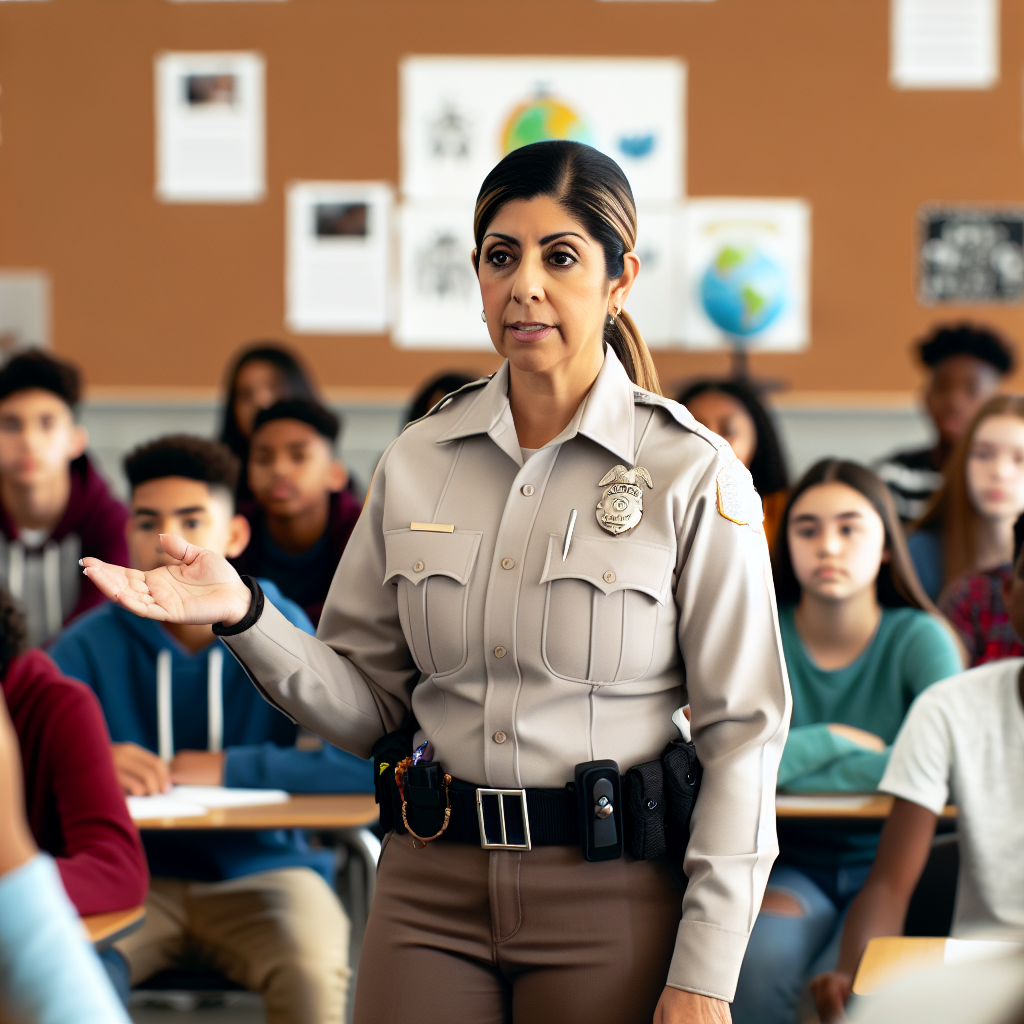Introduction
In today’s schools, School Resource Officers (SROs) play a vital role in maintaining safety and security.
SROs are sworn law enforcement officers responsible for ensuring the safety of students, staff, and faculty.
They act as a liaison between the school and law enforcement agencies, providing a sense of security.
Importance of SROs
SROs help prevent and respond to incidents of violence, drug abuse, and other criminal activities on campus.
They build positive relationships with students, fostering trust and promoting a safe learning environment.
Challenges Faced by SROs Today
One challenge SROs face is balancing law enforcement duties with building relationships and providing support.
Another challenge is staying updated on evolving safety threats and technology used by students for misconduct.
Additionally, SROs must navigate complex legal and ethical issues when interacting with students and school staff.
Lack of Proper Training and Resources
Despite the crucial role they play in schools, School Resource Officers (SROs) face a myriad of challenges in carrying out their duties effectively.
One of the major hurdles they encounter is the lack of proper training and resources.
Importance of Specialized Training for SROs
Specialized training is essential for SROs to effectively handle various situations that may arise in a school setting.
They need specific expertise in areas like conflict resolution, mental health awareness, and de-escalation techniques.
Without this training, SROs may struggle to respond appropriately to the complex needs of students and staff.
Inadequate Funding for SRO Programs
Another significant challenge faced by SROs is inadequate funding for their programs.
Budget constraints often result in limited resources for training, equipment, and support services.
This lack of investment can hinder the ability of SROs to perform their duties effectively and may compromise the safety of the school community.
Impact of Lack of Training and Resources on Effectiveness
The lack of proper training and resources can have a direct impact on the effectiveness of SROs in maintaining a safe and secure learning environment.
Without the necessary skills and tools, SROs may struggle to build positive relationships with students, identify potential threats, or intervene in crisis situations.
This can lead to gaps in school security and may contribute to increased risks for students and staff.
Furthermore, inadequate training can result in misunderstandings or conflicts between SROs and the school community, which can erode trust and cooperation.
Transform Your Career Today
Unlock a personalized career strategy that drives real results. Get tailored advice and a roadmap designed just for you.
Start NowWithout sufficient resources, SROs may also face challenges in coordinating with other law enforcement agencies or accessing specialized support services for students in need.
Addressing the challenges of inadequate training and resources for SROs is imperative to ensuring the effectiveness of these officers in safeguarding schools.
By investing in specialized training programs and providing sufficient funding for SRO initiatives, schools can enhance the capabilities of these officers and promote a positive and secure learning environment for all.
Highlighting the Dual Role of SROs
SROs are not just law enforcement officers.
They are also mentors and role models for students in schools.
They play a crucial role in ensuring the safety and security of the school environment.
They also provide support and guidance to young people.
Challenges of Balancing Responsibilities
One of the main challenges faced by SROs is finding the right balance.
They must enforce the law while serving as mentors for students.
SROs must navigate complex situations.
They need to make decisions that are in the best interest of both the school community and individual students.
Importance of Building Trust and Relationships
Building trust and relationships with students is essential for SROs.
They need to effectively carry out their dual role.
By establishing rapport and connections with young people, SROs can be more successful.
They can enforce the law, resolve conflicts, and provide support to students in need.
Delve into the Subject: How to Develop a Personal Protection Plan
Addressing mental health issues in schools
- Discuss the increasing need for SROs to handle mental health crises
- School Resource Officers are being called upon more frequently to address mental health emergencies.
- With the rise in mental health issues among students, SROs play a vital role in providing support.
- These officers are often the first responders in situations involving students in crisis.
- Highlight the lack of mental health resources and training for SROs
- Unfortunately, many SROs lack adequate training and resources to effectively address mental health challenges.
- They may not have the necessary skills to de-escalate a situation involving a student in distress.
- Without proper training, SROs may inadvertently exacerbate the mental health crisis.
- Mention potential solutions or strategies for addressing mental health challenges
- One solution is to provide specialized training for SROs on how to handle mental health crises.
- Collaboration with mental health professionals can also improve the ability of SROs to support students.
- Creating partnerships with community organizations can expand access to mental health resources for students.
Uncover the Details: Fish and Game Warden vs. Park Ranger
Addressing the challenges of working with students from different cultural and socioeconomic backgrounds
- Understanding cultural differences: School resource officers need to educate themselves on the various cultural norms, values, and practices of the student population to avoid misunderstandings or conflicts.
- Overcoming language barriers: Language barriers can hinder communication between officers and students, making it essential for officers to find ways to bridge this gap and ensure effective communication.
- Awareness of socioeconomic disparities: Being sensitive to the financial struggles that some students may face is crucial to avoid making assumptions or judgments based on socioeconomic status.
The importance of cultural competency and sensitivity
- Promoting inclusivity: Cultural competency allows officers to create a welcoming and inclusive environment for all students, regardless of their background.
- Building trust: Demonstrating cultural sensitivity helps build trust between officers and students, fostering positive relationships and cooperation within the school community.
- Reducing bias: Culturally competent officers are less likely to act on stereotypes or biases, leading to fairer and more just interactions with students.
Strategies for building relationships and understanding with diverse student populations
- Engage in cultural competence training: Officers can participate in training programs that enhance their understanding of different cultures and help them develop the skills to interact effectively with diverse populations.
- Establish open communication channels: Creating opportunities for students to share their perspectives and experiences can help officers gain valuable insights and foster mutual understanding.
- Get involved in the community: Building relationships outside of law enforcement roles, such as volunteering or attending cultural events, can help officers connect with students on a personal level and show their commitment to understanding and supporting diverse communities.
By addressing the challenges of working with students from diverse backgrounds, school resource officers can create safer and more inclusive learning environments where all students feel respected and valued.
Gain More Insights: Legal Authority of Campus Security Officers
Transform Your Career Today
Unlock a personalized career strategy that drives real results. Get tailored advice and a roadmap designed just for you.
Start Now
Navigating school policies and regulations
One of the main challenges faced by School Resource Officers (SROs) today is navigating through school policies and regulations.
- Working within the framework of school policies and regulations
- Balancing school rules with law enforcement duties
- Importance of clear communication and collaboration
SROs must understand and abide by the policies set by the school administration while upholding their law enforcement duties.
It can be a delicate balance for SROs to enforce school rules while ensuring the safety and security of the school community.
SROs must have open lines of communication with school administrators to effectively address any issues or concerns that may arise.
See Related Content: Top Security Consulting Firms in the USA
Handling school safety and security threats
Discuss the increasing prevalence of school safety threats and incidents:
In today’s society, schools are facing a growing number of safety threats and incidents.
From bullying to active shooter situations, school resource officers (SROs) play a critical role in maintaining a safe and secure learning environment for students and staff.
With the rise in these threats, SROs must constantly adapt to new challenges and be prepared to respond effectively in emergency situations.
Address the challenges of preventing and responding to emergencies:
One of the biggest challenges faced by SROs today is the unpredictable nature of emergencies.
Whether it’s a natural disaster, a violent incident, or an active shooter situation, SROs must be trained to respond quickly and effectively to protect the lives of those in their care.
This requires ongoing training, preparedness, and the ability to think quickly on their feet in high-stress situations.
Mention the importance of training and preparedness for SROs in addressing security threats:
Training and preparedness are essential for SROs to effectively handle security threats.
SROs must undergo regular training to stay updated on the latest safety protocols, communication techniques, and crisis management strategies.
By investing in ongoing training and preparedness, SROs can better protect the school community and respond proactively to potential threats.
Challenges Faced by School Resource Officers
School Resource Officers (SROs) face numerous challenges that impact their ability to effectively serve their schools.
They handle mental health crises, de-escalate conflicts, and manage student relationships.
SROs navigate a complex role that requires a delicate balance of skills and responsibilities.
Recognizing the importance of supporting and empowering SROs in their roles is crucial.
Providing necessary resources, training, and mental health support can help them better respond to the diverse needs of students.
Transform Your Career Today
Unlock a personalized career strategy that drives real results. Get tailored advice and a roadmap designed just for you.
Start NowThis approach ensures a safe learning environment for all.
Additionally, there is a pressing need for increased attention and resources to address the challenges faced by SROs in schools.
By investing in their professional development, promoting collaboration between schools and law enforcement, and fostering positive relationships with students, we can enhance their effectiveness.
This ultimately promotes safer, more inclusive school communities.
Additional Resources
School Resource Officers: Issues for Congress | CRS Reports
REL Ask A REL | What does research say about the effect of school …
[E-Books for Sale]
The Big Book of 500 High-Paying Jobs in America: Unlock Your Earning Potential
$19.99 • 500 High-Paying Jobs • 330 pages
Explore 500 high-paying jobs in America and learn how to boost your career, earn more, and achieve success!
See All 500 High-Paying Jobs of this E-Book
1001 Professions Without a Degree: High-Paying American Jobs You Can Start Now
$19.99 • 1001 Professions Without a Degree • 174 pages
Discover 1001 high-paying jobs without a degree! Unlock career tips, skills, and success strategies for just $19.99!




